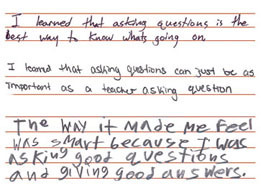"Having essential questions drive curriculum and learning has become core to many educators' instructional practices. Grant Wiggins, in his work on Understanding By Design, describes an essential quetion as:
A meaning of “essential” involves important questions that recur throughout one’s life. Such questions are broad in scope and timeless by nature. They are perpetually arguable – What is justice? Is art a matter of taste or principles? How far should we tamper with our own biology and chemistry? Is science compatible with religion? Is an author’s view privileged in determining the meaning of a text? We may arrive at or be helped to grasp understandings for these questions, but we soon learn that answers to them are invariably provisional..."



 Your new post is loading...
Your new post is loading...









So true... I cringe when I am in classrooms with the packaged program "essential question" of the week on the board...and very often those "essential questions" lack cognitive clarity for the students
A great summary of why questioning still matters. We've been talking about metacognition a lot this year in the library. Learning how to develop questions is a large part of learning how you learn and think.
This quote is so true. Learning how to ask essential questions is a skill that we can carry with us for the rest of our lives and facilitates a lifetime of learning.